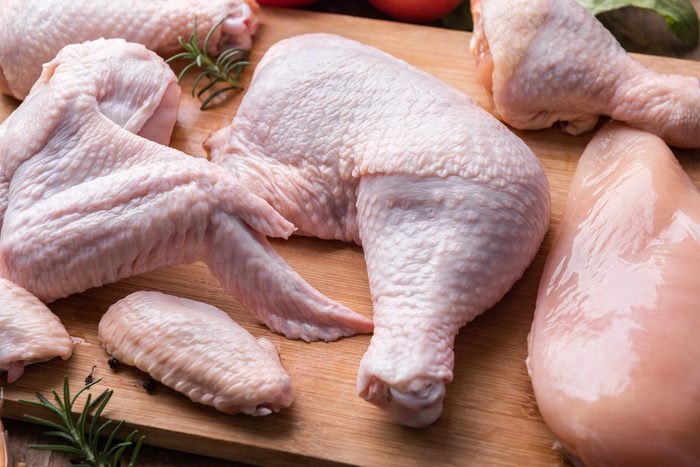
Talk about protein has been all the rage in recent years. Maybe you’ve turned to protein powders, high-protein meals, and plant-based proteins to help you get lean, develop muscle, and even possibly live longer, since some experts say having a healthy amount of muscle, proportionate to fat, is one of the keys to longevity.
For anyone, it’s smart to know how much protein to eat in a day. However, one major factor that dictates the effectiveness of the protein you eat is the quality of the protein.
As a registered dietitian, I love to explain that amino acids are essential building blocks for protein. Nine particular amino acids are considered essential because the body cannot produce them on its own—and meanwhile, they impact key physiological functions like muscle repair, hormone production and immune support…all essential needs, indeed.
The nine essential amino acids are:
- histidine
- isoleucine
- leucine
- lysine
- methionine
- phenylalanine
- threonine
- tryptophan
- valine.
A complete protein contains all nine essential amino acids. These can be found in animal-based sources, as well as some plant-based sources. Incomplete proteins lack one or more essential amino acids but can be combined with specific foods to create a complete protein source that provides all the essential amino acids needed by the body.
Whether you prefer animal or plant-based sources, the key is to find what feels best to your body. These are the top protein sources that can fuel and energize your journey toward optimal wellness, making them the perfect proteins—or super-close to perfect.
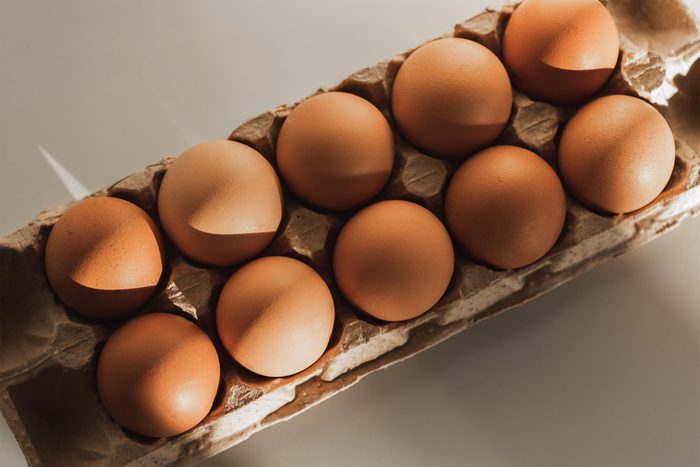
1. Eggs
Eggs are widely recognized as a nutritious source of protein. Eggs contain all nine essential amino acids the body needs and are considered a complete protein.
Eggs have many health benefits, according to a 2020 review found in Nutrients. The protein in eggs was demonstrated to support skeletal muscle health and protect against sarcopenia (muscle loss), as well as decrease appetite, which resulted in a reduction in the caloric intake from the next meal—and therefore, also resulted in weight loss.
One large egg provides about six grams of protein, as well as vitamins B12 and vitamin D, and minerals like iron, selenium, and zinc. These nutrients are important for supporting immune function, brain health, and red blood cell production.

2. Lean chicken
Chicken is a rich source of high-quality protein, providing approximately 31 grams of protein per 3.5 ounces. Chicken contains all the essential amino acids the body needs for muscle repair, growth, and maintenance.
To maintain its lean protein profile, you’ll want to choose lean cuts of chicken, remove the skin, and choose cooking methods that minimize added fats.
Sustainable Meat: The Best and Worst Kinds, Ranked by Sustainability Experts
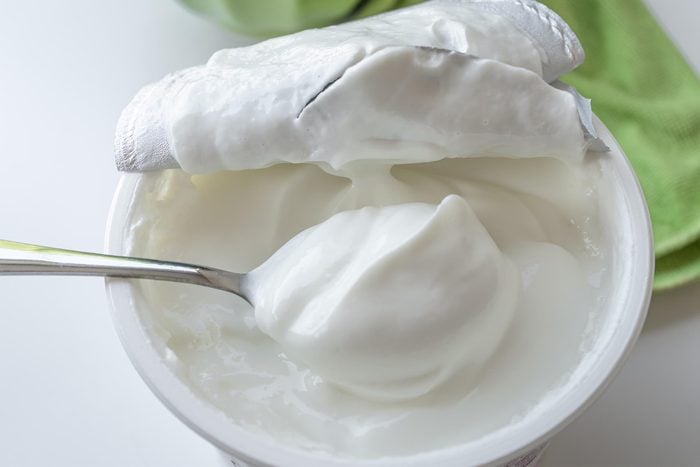
3. Greek yogurt
Greek yogurt typically contains around twice the amount of protein compared to regular yogurt—and often less sugar.
Greek yogurt is packed with protein, usually containing around 20 grams per six-ounce serving. Greek yogurt often contains live and active cultures, which are beneficial bacteria that can support gut health and digestion. These probiotics can aid in maintaining a healthy balance of bacteria in the gut.
The Healthy @Reader’s Digest’s Medical Review Board co-chair Latoya Julce RN, BSN says though she typically avoids dairy, she does enjoy Greek yogurt about once a week for its health benefits—plus, “It’s also so easy to pack and grab.”
14 High-Protein Breakfast Ideas That Will Help You Lose Weight
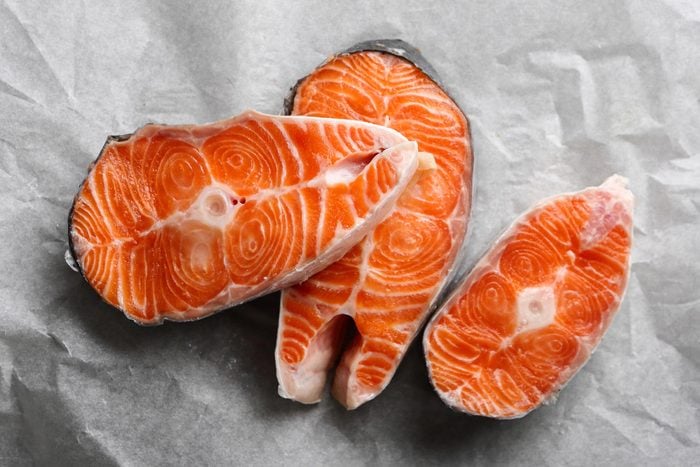
4. Salmon
Salmon is a fish rich in protein—a 3.5-ounce serving of cooked salmon provides around 22 grams of protein—and nutrients like selenium, B vitamins and vitamin D.
Salmon is also an excellent source of omega-3 fatty acids, particularly eicosapentaenoic acid (EPA) and docosahexaenoic acid (DHA). These fatty acids have been linked to numerous health benefits, including heart health, brain function, and reducing inflammation in the body.
Make salmon tacos! Just fill whole wheat or pure corn tortillas with grilled or baked salmon, along with fresh vegetables, salsa, and a dollop of yogurt or avocado for a tasty and nutritious meal.
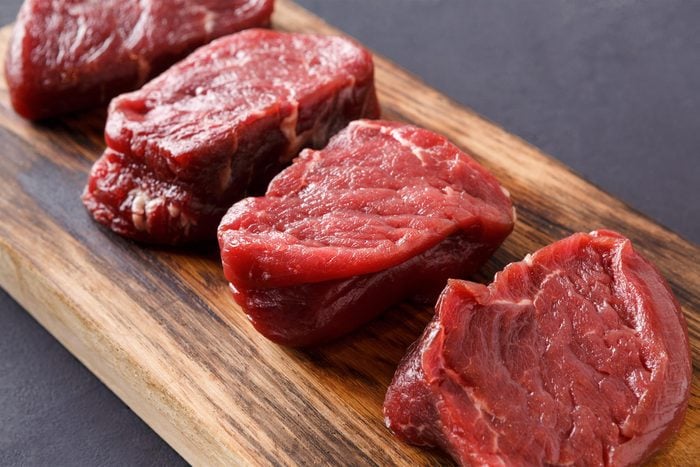
5. Lean beef
Lean beef is considered a good source of protein. It is particularly valued for its high-quality protein content, which means it contains all the essential amino acids that your body needs. A 3.5-ounce serving of cooked lean beef boasts about 26 grams of protein.
Cuts from the loin or round typically have a lower fat content compared to fattier cuts. Beef is also a rich source of iron, zinc, and vitamin B12, which play vital roles in maintaining healthy muscles, supporting cognitive function, and contributing to overall well-being.
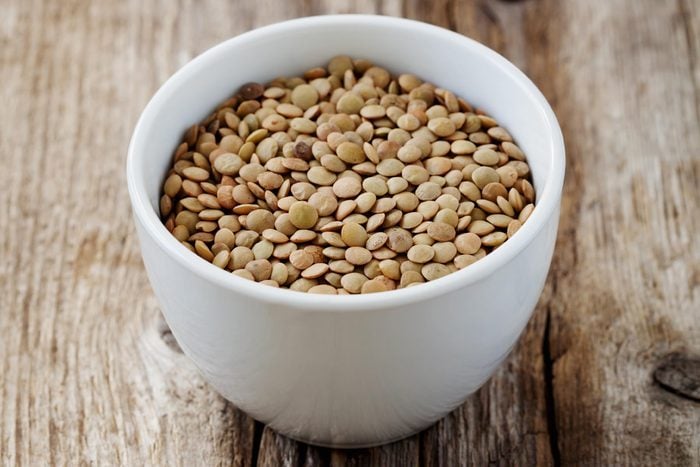
6. Lentils
Lentils are a versatile legume providing an excellent plant-based protein source. (They’re also an amazing comfort food in cooler months!) In one cooked cup of lentils, you’ll get around 18 to 20 grams of protein.
Lentils happen to lack the amino acid methionine, therefore they are not quite a complete protein. The good news? Pairing them with rice—as many delicious South Asian dishes do—will help make them a complete protein.
Lentils are also high in fiber, folate, and iron. A 2023 systematic review and meta-analysis found in the journal Advances in Nutrition examined the impact of legume consumption on cardiometabolic health. The research found that consuming legumes like lentils can help prevent cardiovascular disease.
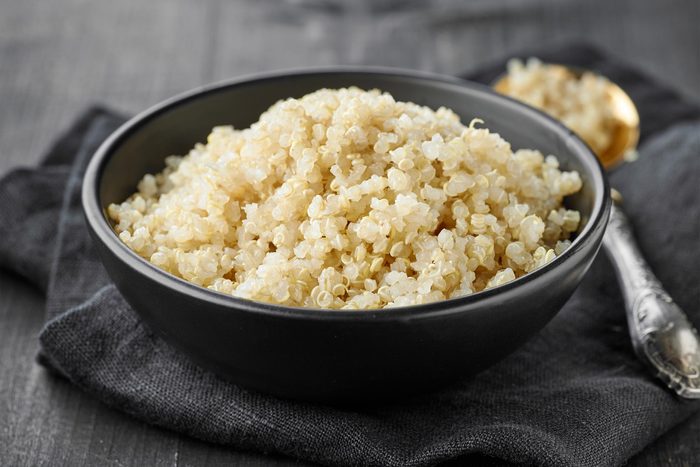
7. Quinoa
Quinoa is a plant-based complete protein, containing all the essential amino acids your body needs. Quinoa is also rich in fiber, complex carbohydrates, and vitamins and minerals like iron and magnesium.
Quinoa offers around eight grams of protein per cooked cup. One 2017 study explored the effects of quinoa consumption on blood sugar and found that individuals who incorporated quinoa into their diet experienced improved blood sugar management.
Quinoa makes a fantastic base for salads or can be transformed into a tasty pilaf by sautéing onions, garlic, and vegetables.
Drink This Every Day For Lower Blood Sugar and Better Gut Health, Says New Study
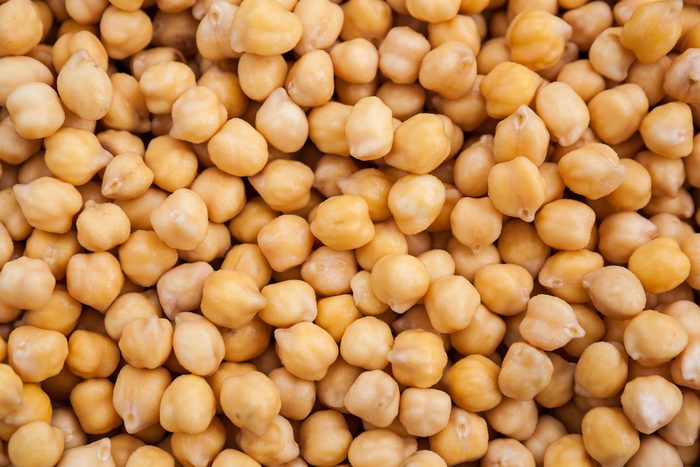
8. Chickpeas
With approximately 15 grams of protein per cooked cup, chickpeas are a staple in vegetarian and vegan diets. They are a plant-based protein option that is highly nutritious and rich in not only protein, but fiber and antioxidants such as flavonoids and polyphenols, which help protect against oxidative stress and inflammation in the body.
Chickpeas lack the sulfur-containing amino acids methionine and cystine, but you can pair chickpeas with rice, oats or wheat to make them complete (just one more reason to love hummus on whole wheat pita!). Incorporating chickpeas into your meals can help support muscle function and promote digestive health. They can be enjoyed in many dishes such as in salads, stews, curries, hummus, or roasted as a crunchy snack.
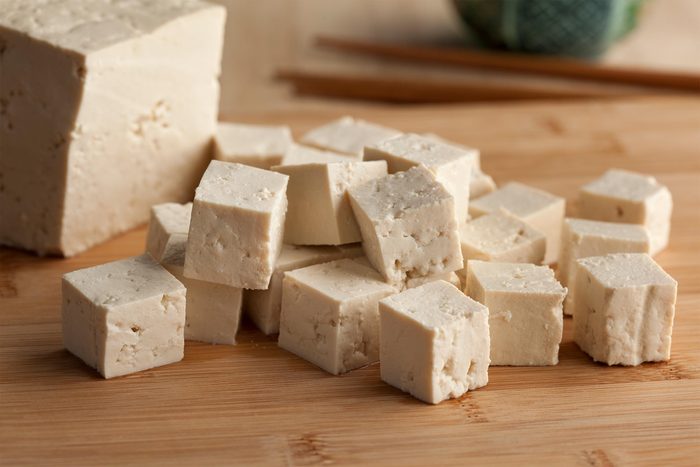
9. Tofu
Tofu is made from soybeans and is considered a complete protein, providing all the essential amino acids your body needs. It offers approximately 10 grams of protein per 3.5-ounce serving. It is also low in saturated fat.
In addition to protein, tofu is a good source of iron, calcium, and other minerals. It is also rich in plant compounds called isoflavones, which have been associated with potential health benefits such as reducing the risk of certain chronic diseases when consumed in moderation.
Tofu is versatile and can be prepared in various ways such as grilling, stir-frying, baking, blending into smoothies, or adding to scrambled eggs. Its mild flavor allows it to take on the flavors of other ingredients.
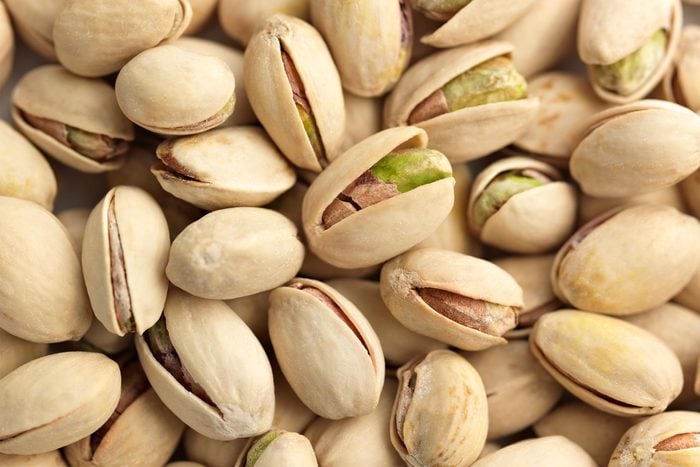
10. Pistachios
Pistachios are a good source of plant-based protein, healthy fats, fiber, vitamins, and minerals. Pistachios also contain antioxidants and may aid in weight management. They offer approximately six grams of protein per ounce and are a nutritious snack option that can contribute to your overall protein intake, especially when combined with other plant-based protein sources.
Pistachios can be enjoyed in various ways: Mixed with other nuts and dried fruits, added to salads for a crunchy texture, incorporated into baked goods, or sprinkled on top of yogurt or salad. You can also make delicious homemade pistachio butter.
By including a diverse range of protein sources, you can ensure that you are obtaining a wide spectrum of essential amino acids and other important nutrients that are vital for optimal health and wellbeing. Each of these protein sources offers unique health benefits and nutritional profiles, contributing to a well-rounded and balanced eating routine. Individual protein needs vary based on many factors like age, gender, activity level, and overall health status. For personalized protein recommendations, it’s important to consult with a registered dietitian nutritionist or other licensed or certified health professional.

